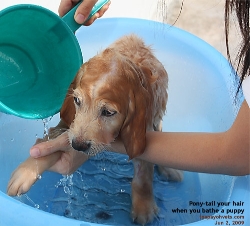"Singapore vets don't treat rats," the slim office lady in her late 20s showed me a 2.5-year-old white rat whose girth seems to be 10X than normal rats. The lady placed on my consultation table a piece of paper, "I print out from the internet a listings for vets in Central Singapore."
"I have to disagree with you," I replied. "Did you start from A to Z" in the veterinary surgeon listings in the internet? "Normally, a prospect will phone 'A' listings first. Did you try the AAAA veterinary practice which is No. 1 on the usually veterinary list and should get the first prospect? Toa Payoh Vets is unfortunately at the bottom of the list. I should rename my surgery as AAAAA as there are advantages of being No. 1."
The young lady did not appreciate my humour. "There are 2 vet practices you ticked," I pointed to the blue pen marks on her paper.
"Yes, but the vets are not available," the slim office lady in black-framed glasses replied. "One could only see me 2 days later and one vet wanted a later appointment.".
"Many Singapore vets dislike treating rats. Is your rat in poor health?"
"My boss rescued this abandoned laboratory rat and kept him in the office. For the past few days, he had been eating and drinking less. Some 7 days ago, Vet 1 treated him for some skin infections behind and above his neck. The vet gave us a spray and we sprayed onto the sore wound. The skin problem is OK now. He just would not eat or drink as normal."
"He looks like a miniature polar bear," I recalled seeing National Geographic Magazine pictures of well fed and thick coated polar bears in winter.
"Don't worry. This rat does not bite," she said. My assistant Mr Saw took out and put on a cloth glove in his right hand, just in case. I took the owner's word and lifted the rat out of the blue plastic carrier basket. The rat looked like a gentle bear and I took my chances by handling him with my bare hand.

I palpated the rat as the owner complained that he had some swellings in his flank. They were faecal lumps. "Your rat is constipated as he has not been drinking much," I could feel many small faecal lumps inside his belly. Can you give oral medication to the rat in your office?" Treatment at the office would save some money for the boss.
The lady said OK and probably thought: "Just put the medication in the cage and the rat will eat it."
This would not be so simple in reality. So I asked the lady to sit down and asked Mr Saw, my Assistant to demonstrate how to give the rat medication and electrolytes by mouth using a 1-ml syringe. The office lady was not sure that she could hand-feed the rat, saying: "The care-giver usually does this but she is overseas now."
The rat was warded for two days in this case and given electrolytes, Fibreplex and antibiotics orally at least 3 times per day.
On day 2, he still had not passed faecal lumps but was more lively. No stools were passed overnight. On day 3, he passed stools and had eaten. He would go home.
 TOA
PAYOH VETS
TOA
PAYOH VETS
